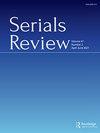我们知道我们发布什么吗?自报出版数据与Scopus和Web of Science的比较
IF 0.9
4区 管理学
Q3 INFORMATION SCIENCE & LIBRARY SCIENCE
引用次数: 0
摘要
摘要科研生产力是衡量大学产出的一项基本定量指标,但要全面了解一所大学的科研产出是困难的。像Web of Science和Scopus这样的数据库可以提供与一个机构相关的出版物列表,但是它们所涵盖的格式和学科是有限的。一个机构可以依靠它的研究人员提供关于他们自己的出版物的信息,这可能会避免格式和学科的限制,但是这些数据对于研究评估来说往往太混乱或不完整。本研究将通过Web of Science和Scopus获得的研究生产力数据与科罗拉多大学科罗拉多斯普林斯分校(UCCS)研究人员提供的数据进行了比较。该研究旨在确定某些学科在每个数据集中的表现是否有利或不利,并确定研究人员自己提供的数据的完整性。我们认为基于研究者提供的数据进行UCCS的研究评估可以得到更全面的结果。本文章由计算机程序翻译,如有差异,请以英文原文为准。
Do We Know What We Publish? Comparing Self-Reported Publication Data to Scopus and Web of Science
Abstract Research productivity is a basic quantitative measure for universities, but obtaining a comprehensive view of a university’s output is difficult. Databases like Web of Science and Scopus can provide a list of publications associated with an institution, but they are limited in the formats and disciplines they cover. An institution can rely on its researchers to provide information on their own publications, which may avoid format and discipline limitations, but the data is often too messy or incomplete for research assessments. This study compares research productivity data obtained through Web of Science and Scopus to self-provided data from researchers at the University of Colorado Colorado Springs (UCCS). The study seeks to determine if certain disciplines are advantaged or disadvantaged by their representation in each dataset and to determine how complete researcher’s self-provided data is. It was determined that basing UCCS’s research assessment on researcher provided data led to more comprehensive results.
求助全文
通过发布文献求助,成功后即可免费获取论文全文。
去求助
来源期刊

Serials Review
INFORMATION SCIENCE & LIBRARY SCIENCE-
CiteScore
1.60
自引率
11.10%
发文量
49
期刊介绍:
Serials Review, issued quarterly, is a peer-reviewed scholarly journal for the international serials community. Articles focus on serials in the broadest sense of the term and cover all aspects of serials information; regular columns feature interviews, exchanges on controversial topics, book reviews, and conference reports. The journal encompasses practical, theoretical, and visionary ideas for librarians, publishers, vendors, and anyone interested in the changing nature of serials. Serials Review covers all aspects of serials management: format considerations, publishing models, statistical studies, collection analysis, collaborative efforts, reference and access issues, cataloging and acquisitions, people who have shaped the serials community, and topical bibliographic studies.
 求助内容:
求助内容: 应助结果提醒方式:
应助结果提醒方式:


